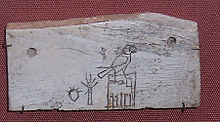Benerib
| Benerib | |
|---|---|
 Names of Benerib and Hor-Aha, British Museum | |
| Queen consort of Egypt | |
| Tenure | c. 3050 BC |
| Died | c. 3050 BC |
| Burial | B14, Umm el-Qa'ab |
| Spouse | Pharaoh Hor-Aha |
| Dynasty | 1st Dynasty of Egypt |
| Religion | Ancient Egyptian Religion |
Benerib (fl. c. 3050 BC) was a queen consort of ancient Egypt from First Dynasty. Benerib's name means "sweet(bene) of heart(ib)".
Biography
| |||
| Benerib [1] in hieroglyphs | |||
|---|---|---|---|
| Era: Old Kingdom (2686–2181 BC) | |||
Benerib was a wife of pharaoh Hor-Aha,[2] but she was not the mother of his heir, Djer. The mother of king Djer is named as Khenthap, another wife of Hor-Aha. Benerib is thought to be the wife of Hor-Aha based on ivories found in her tomb at Abydos which show his name. A fragment of an ivory box with the names of Hor-Aha and Benerib was also found at Abydos and is now in the Boston Museum of Fine Arts.[3]
Egyptologist John Romer argued that Benerib's name, which can be translated to "sweetheart" or "one who is pleasant at heart", may not even be a name at all but rather a title or epithet for a person whose sex is also not confirmed by the name.[4]
Benerib's titles are not known, and neither is the identity of her parents.
Benerib was buried at Umm el-Qa'ab in tomb B14.[5]
References
- ^ J. Tyldesley, Chronicle of the Queens of Egypt, 2006, Thames & Hudson
- ^ Aidan Dodson & Dyan Hilton, The Complete Royal Families of Ancient Egypt, Thames & Hudson (2004), p.46
- ^ B. Porter and R.L.B. Moss. Topographical Bibliography of Ancient Egyptian Hieroglyphic Texts, Reliefs, and Paintings, V. Upper Egypt: Sites. Oxford, 1937, pg 88,89
- ^ Romer, John (2013). A History of Ancient Egypt: From the First Farmers to the Great Pyramid. London: Penguin. p. 218. ISBN 978-0-14139-971-3.
- ^ B. Porter and R.L.B. Moss. Topographical Bibliography of Ancient Egyptian Hieroglyphic Texts, Reliefs, and Paintings, V. Upper Egypt: Sites. Oxford, 1937, pg 88,89

